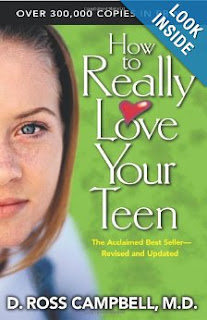Dr. D. Ross Campbell wrote this book based on his experiences of not only being the father of four grown children, but also on years of being a psychiatrist serving adults, adolescents and children.
What did I learn? Here's a few noteworthy tips:
1) Give Unconditional Love - love your teen no matter what he look like, no matter how he acts, no matter if he makes the honor roll, varsity team or first string in band, no matter which friends he chooses... we get the point.
On the converse, conditional love may make your teen feel insecure, damage his self-image and prevent him from developing more mature behavior.
2) Parents need to remember that:
- teenagers are children.
- teenagers will usually act like teenagers.
- much of teenage behavior is unpleasant.
Question raised at a recent middle school parent orientation: The speaker said something like "Let me see a show of hands of those who loved junior high, can say it was the best time of your life and would go back if they could." Not surprisingly, no hands went up. Hmm...
3) Most important question on a teen's mind: Do You Love Me? Even if they don't know it. This question is asked primarily through behavior, rather than with words.
4) Teens test their parents. Don't overreact emotionally and maintain self-control. Do you respect someone who responds with a tantrum? They test us with information designed to upset or irritate us to see if we can be trusted with what's on their minds. Recognize the importance of "Oh, by the way" - they are asking if we are in the right frame of mind can handle their issue.
5) Teens need training in how to handle anger. Anger is normal and occurs in every human being. Encourage them to bring their anger to you and praise them for doing so. Two serious long-term affects of not handling anger include distorting their personality and interfering in current and future relationships. Passive-Aggressive behavior is worst form of anger. The majority of organizational problems are personnel related as so few people learned how to deal with anger appropriately.
6) Even if they don't know that they do or act like they do, teens continue to need love, affection, assurance and care as never before. Yet their biological drive for independence is growing. No wonder it's tough. Give appropriate eye contact and physical contact.
7) In setting limits: it's better to start more strict and restrictive. If you begin with being "broadminded/reasonable/understanding," you have only one way to go when she pushes the boundaries and that's to be bad guy. Starting more restrictive, you can afford to be positive and grant privileges (the good guy) and reward your teen for taking increased responsibility.
8) Be civil to all of your teen's friends, even if you don't like them. If you are, he will most likely bring more friends around and you'll avoid pushing your teen towards them and away from you.
9) Why are teens so apathetic, lack initiative and poorly motivated? They need hope in the future. We need to pass on determination, hope & encouragement. We're not the first generation to experience problems. Most of us haven't even lived through a world war or The Depression or The Holocaust. Too many of us yield to pessimistic influences. Pessimism is not the teaching of Christ. His message is one of hope and joy. Read Mark 13:32-33. Watch and pray. Parents must possess a solid foundation in order to pass it along to their children.
10) Teenagers are children in transition, not young adults. Their needs, including emotional ones, are those of children.
11) Evidence indicates that the home is the stronger than any other influence in determining how happy, secure and stable teenagers are; how they relate to adults, peers or children how confident they are in themselves, and how they respond to new or strange situations.
Many of these suggestions and ideas from Dr. Campbell can be used well before the teen years.
To read more, find the book here

No comments:
Post a Comment
Unless you sign up with Google to comment, you will show as Anonymous. Please leave your name if you want me to know who you are.
Thanks for your feedback!